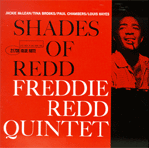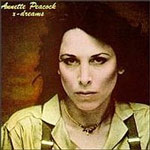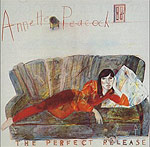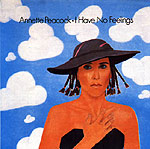Annette Peacock and the Bible of X-Dreams | |

| I "Perfect fear casteth out all else" (Sylvia Plath, 'Johnny Panic and the Bible of Dreams') Release the bats, blot out the darkness, prepare the garlic. It's puzzling why there's such a taboo against the nocturnal, turning out the lights, switching into dream states, twitching back to wakefulness. While Kafka spent a lot of time pondering those uneasy hours between daylight and the penal colony of insomnia, it's a wonder he didn't write a full-scale study of dreams. Kafka's interpretation of dreams is there on every page of his work, though, as there is barely a moment in his writing which isn't informed in some way by those fractured silences and the deep nocturnal logic of night drift. Similarly, Graham Greene's inspiration was equally governed by his late night communions, semi-somnolent addresses to the chaotic knots of insight and disembodied observation which line his writing. There is a volume of Greene's recorded dreams, entitled A World of My Own, published posthumously so as not to cause offence to contemporaries whose spectres visited him while between the sheets. But, as I'd argue, there is little to differentiate the inspiration of the novels and stories from the flickering continuity and arbitrary cutting and fragmentation of a film or dreamscape. On page after page of Paul Morley's book Nothing, or his writings on Joy Division, there is an overwhelming sense of the accumulated deposits and untrammelled detours of the mind in thrall to its own processes. Like Kafka burying K. in layer after layer of snow in The Castle, he throws up images of repetition and spiralling dissociation, only to be caught short and reminded of the thingness of things, a Coke bottle, a torn photo. Morley's excursions into melancholia put me in mind of Ornette Coleman, which may seem puzzling at first sight, but those sentences have the density and gravitational pull of the best passages of 'Lonely Woman' or 'Focus on Sanity'. A good Morley sentence, like a good Coleman solo, is a circle with a hole in the middle. And wasn't it Coleman who said that playing jazz was like walking down the street with nothing on? And, more intriguingly, aren't dreams more than real? And aren't vampire myths so many old wives' tales devised to train schoolchildren to stick to normal hours and strict timetables, when you'd much rather be training a torch on a thing of infinite richness, the exotic pages of a novel, and letting the imaginative spotlight roam free. Under the covers, where the wild things roam free. I can't say I'm too enthralled at the prospect of new release Shadow of a Vampire, which claims to dramatize Murnau's work on the Dracula legend while making Nosferatu with the infinitely enigmatic, emaciated Max Schreck. A great punk name, meaning Max Terror, eerily prophetic as labels go. But nay, nay, thrice nay, Murnau's work is best experienced in a darkened theatre, or on a decent sized tv screen. Those moments in Sunrise- A Story of Two Humans where torches search the river late at night, casting beams of light over darkness. Tabu with those strange bodies from the South Sea Islands observed swimming in semi-documentary fashion. Filmmaking that only a select band could aspire to, Nick Ray for instance, turning his back on Western eyes and telling a tale of eskimo attitudes to life and, most tellingly, death in The Savage Innocents. |

| Eskimos in igloos and naked swimmers, underground and far away, but fresh wild and exciting. There's strangeness in abundance there, which reminds me of an oddly prophetic moment in the liner notes to a lovely 1960's bop outing which helps explain the difference between tradition and genuine modernism in music. It's there, betrayed by its tone of patronizing self-importance, in Nat Hentoff's gloss to the beautiful 'Blues-Blues-Blues' on the splendid Shades of Redd date by the Freddie Redd Quintet. His original 1960 commentary unwittingly encapsulates the borderline between old school jazz, a thing of beards and woolly jumpers, thick tomes of elaborate scholarship and pedantic pickiness, and the clean air gulped down by the New Thing. "The line of 'Blues-Blues-Blues' has an unforced traditional feeling although it ends, like much in contemporary life, in mid-air". I can smell the pipe smoke accompanying that creaking "although". Hentoff may usually be a respected authority on jazz from its early decades onwards, but there's an air of resigned weariness here. Were the swirls, whorls and curlicues of the free jazzers or the more exploratory arm of the hard bop movement too butterfly-like for this man's sensibilities? From Ayler onwards, jazz messengers took the form of Lolita-like sylphs, fluttering capriciously around the ears of the philistines in black tie. The lure of those yearning lingering tones, tantalizing but infuriatingly difficult to pin down. No, those lines of flight and self-exhausting Catherine Wheels of emotion would have been more lovingly described by that master butterfly collector, Vladimir Nabokov. This is music which is celebratory in the face of enveloping gloom, as defiant as Nabokov's own Laughter In The Dark, aka Camera Obscura. By casual coincidence, it was a favourite novel of Douglas Sirk's. It's a masterly dissection of desire and despair, and easy to see why this work haunted Sirk, with its harlequin variety of tones and mocking colours, so much so that his disciple Fassbinder chose to adapt Nabokov's Despair late in his career, with Dirk Bogarde at his most gnarled. There's colour aplenty on this Redd date, with support from Jackie McLean, magnificent on alto, and Tina Brooks there to set up a dialogue on his languid tenor sax. The nocturnal mood is kept up on the following track 'Shadows', which has a smoky atmosphere and late-night feel which wouldn't be out of place in the Cassavetes film of that name. These shadows are long and thin, the saxes setting the stage for a heartfelt solo by Redd on piano, where he displays his debt to Hampton Hawes and fearless ability to relax into the lingering associations of a mood. The piano keys conjure up the sweet sounds of evening enchantment, a sirocco over a lemon-grove. It's a shame Redd's other major Blue Note outing is no longer available, his soundtrack for Jack Gelber's landmark play about heroin addicts The Connection, which also featured the musical and thespian talents of Jackie McLean. The play was championed by Ken Tynan, who could cut through the sensational aspects to appreciate the genujne need for a play which addressed the issue head-on. It also happened to be filmed in jerky empathetic style by Cassavetes acolyte Shirley Clarke, a renegade filmmaker who has yet to receive her due. |

| II "And around I go like a carousel/ Since I fell for love like a child" (Annette Peacock) Annette Peacock has been a renegade musical figure for the best part of 40 years now, and all her work possesses the fearsome self-assurance and razor's edge abandonment to self-revelation at the risk of self-immolation of the most radical pioneers. An Absolute Beginner of the synthesizer domain, her music comes across with Purple Heart directness. Much to his chagrin, David Bowie coveted her services at one point, only to have them denied him. Someone who combines the utterly committed self-exposure of Albert Ayler, whose influence she absorbed in the 60's, with the unforced aplomb of the high-wire artist. In her recent offering An Acrobats Heart she has delivered a new instalment in her affair with musical virtuosity combined with vocal dislocation. By doing away with computer programming and Moog wiring she sets up a new acoustic chamber zone which registers the tensions of minute physical and psychic impulses, her voice and piano strung up above the safety net of the Cikada String Quartet. The cd bears the hallmarks of an ECM product, devilishly pared down in its sleeve design. Photographed on the front cover, she takes you aback with the unflinching quality of her straight to camera gaze. I can't think of another cover shot from ECM's back catalogue which quite assaults the viewer in the same way. Countless albums from the Eicher stable will rest content with evocative monochrome snaps of desolate landscapes or medium shots of Keith Jarrett in action, sleeve-work as decoration, cool and woolly. There's no such concession to metaphysical prettiness here. The action here is in close-up, a firm handshake, hair plaited and dropping in small clusters. Even the rear cover image, depicting an acrobat held centimetres from the ground, is taut, sinewy and painfully stretches your attention. The scene looks for all the world like an outtake from Wim Wenders' Wings of Desire, and it's that film that this record conjures images of. Stripped down to a nucleus of Peacock's voice and piano, with a string quartet backing composed by her over a period of three years. Free-floating, achingly compiled from the most delicate brush strokes, and yet the sum total of the experience is hardly an easy ride, as she takes you on an internal road movie through a divided Berlin of the imagination. Just as Peter Falk, with his dirty old raincoat and glass eye stare, saw things from a refreshingly skewed angle, Peacock's music begins with those moments of finality. Definitive underlinings, pausing to take breath before beginning again. "Over. Every end a new start... Over. Every fear I'm facing takes me to a new place". |

| Peacock's combination of synthesizer processed vocal textures and her lyrics have always been gutsy and unsparing of detail, on records like X-Dreams and In the Streets Too Long. A majestic example is her I Have No Feelings lp, which cumulatively has some of the impact of Sylvia Plath at her most wracked. This isn't the Plath of an undergraduate set text, the fragile victim of an uncaring world. She's far closer to Jacqueline Rose's vision of a free-floating imagination at work setting down dreaming, bewitching transformations of the force of inner journeys. Stalactites hanging, yes Mr Hentoff, in mid-air, frozen between a place of safety and rock-like abandonment. Peacock's music flows seamlessly on I Have No Feelings, capturing flows of perception amidst urgently contrasting passages of music. The combination speaks with a rare intensity, like Furtwangler conducting some unwritten piece of inner psychodrama, far more tetchy and insubordinate than any Beethoven symphony. The drift captured here is exotic and exposed, building on densely compacted musical figures, over which words of mental unease and sexual conflict are played out. The opening track does this in blistering style. 'Nothing Ever Was, Anyway' is a trademark Peacock flourish of bodiless cries, percussion and nocturnal time travel. It's followed by 'Butterflies', which floats assuredly over an electronic backdrop of fear and discovery, metamorphosis and flight. There's a heart-stopping moment at the opening of 'Carousel' where the keyboards take over alone, embodying a sparse refrain, full of emergency siren calls which land me square in the middle of the drama of Cassavetes' Woman Under the Influence. Why does music have to probe so nakedly? These old wounds are dressed with new expertise, the bracingly redemptive feel of A Farewell to Arms. It's evocative of the same dilemmas and rushes of adrenaline which Bo Harwood's minimalist keyboard soundtrack managed so effectively in Cassavetes' film, the more potent for its heartbeat rhythm and dislocated feel. |

| Kafka's story 'First Sorrow' features an aging trapeze artist whose encroaching decline is rapidly dawning to consciousness. It's a delicate piece, all the more nagging and insistent for its understated clamouring. The circus artist is a strangely underappreciated figure, but there's an aura of sinister magic about those who create such visual dreams. It's pondered by William Lindsay Gresham in his biography of Houdini and his lamentably out of print novel of freaks and carny life Nightmare Alley, filmed with such expert assurance and rococo noir exuberance in the 40's with Tyrone Power. Or Kristin Hersh's 'Houdini Blues' from her Hips and Makers lp, authentically claustrophobic in feel, or 80's Edinburgh band The Dog Faced Hermans' more spiky take on similar territory, 'Mary Houdini' from their Humans Fly mini-lp. Another era, another set of parameters to play with. A shake of the dice, falling and laughing. Suspended in mid-air, the story unfurls. Dream on brave dreamer, ignorant of the outcome. Falling to ground, yet never touching it- the view from here is breathtaking. © Marino Guida 2001 |